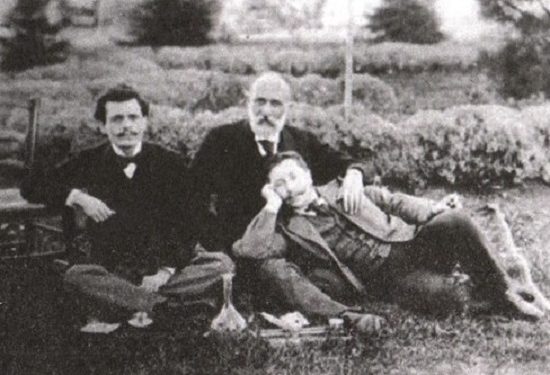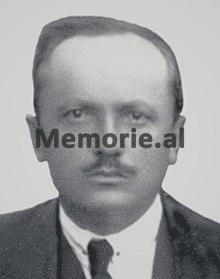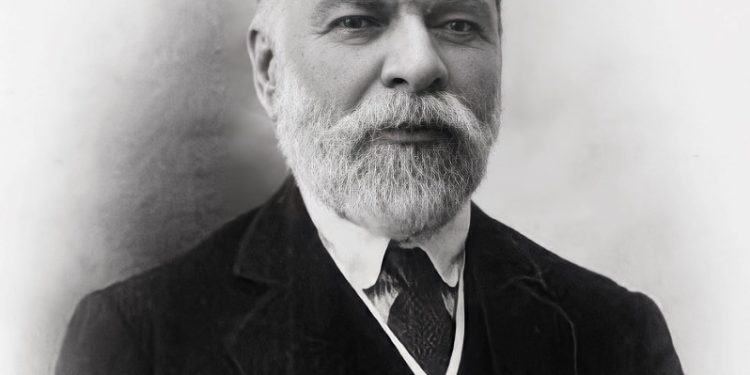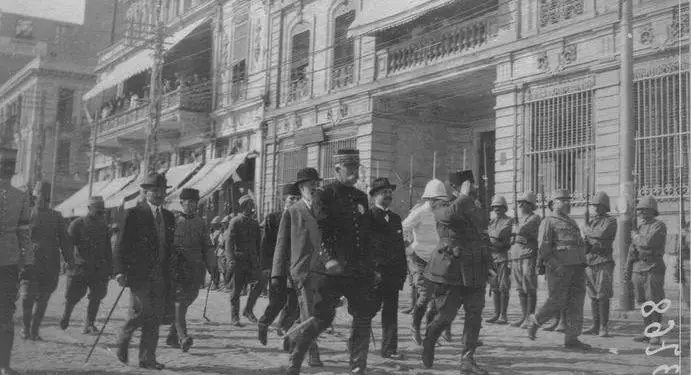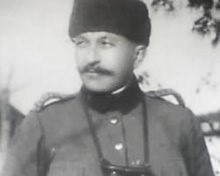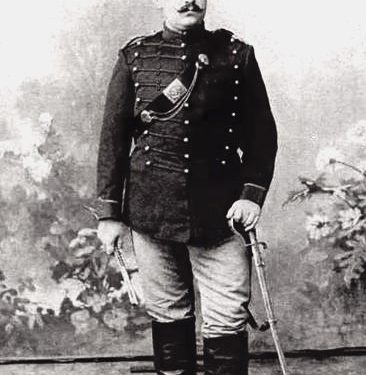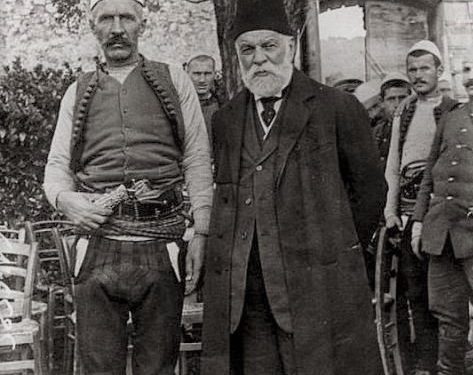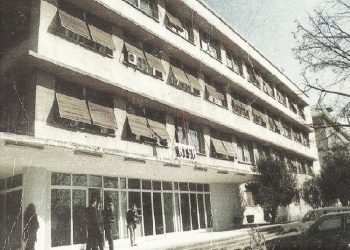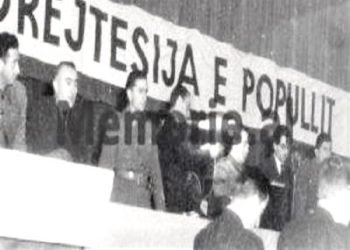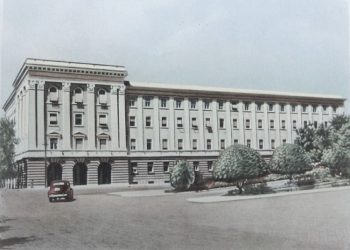By Sejfi Vllamasi
Second part
Memorie.al / From all the provinces of Albania, people’s delegates and a majority of patriots arrived, from inside and outside Albania, and on November 28, 1912, amid great enthusiasm, after 450 years of captivity, the flag was raised national and the independence of Albania was declared. A government was formed under the chairmanship of Ismail Qemali, in which Preng Bibdod Pasha also participated as deputy prime minister and Esat Pashë Toptani as minister of the interior. When Ismail Qemali arrives in Vlora, Seit Qemali, Murat Tërbaçi, Alem Mehmeti and many other patriots, as reservists, fought against the Greek army in Llogara. These, upon being informed about the purpose of the Elder’s arrival in Vlora, raised the national flag at the front of the war, before it was raised in Vlora.
Continues from last issue
Delivery of Ioannina and Shkodra
After the formation of the government in Vlora, Ismail Qemali invited all Albanian officers and patriots, who were among the different fronts of the Balkan War, to stop fighting and return to their homes. Mit’hat Frashëri was against this opinion and went from Vlora to Ioannina twice to encourage the Albanian reservists to continue the war until the end, because he thought that the longer Ioannina remained in the hands of Turkey, the more chance Çameria would have to remain in Albania, while Ismail Qemali had no hope. This was one of the causes of the separation of Mit’hat Frashëri from Ismail Qemali. Later, Mit’hati affirmed that Ismail Qemali was right. Ioannina resisted until March 6, 1913 and surrendered to the Greek army.
Delivery of Shkodra
The Shkodra war raged between the Turkish army of Albanian volunteers, under the command of Hasan Riza Pasha and later Esat Pasha, and the Serbo-Montenegro army. A part of the highlanders of the Great Highlands, forced to immigrate to Montenegro, in the uprising of 1911, had made a common cause with Montenegro and participated in the war against the Turkish army.
The commander of the Turkish army, Hasan Riza Pasha, a distinguished soldier of the Turkish General Staff, was a great soldier and endowed with all the qualities of a noble and good man. During the siege of Shkodra, the Archbishop of Shkodra, Monsignor Jak Serreqi and the abbot of Mirdita, secretly sent Mark Onbash to Vlora to Ismail Qemali, so the two sides were in regular contact during the war.
When the war continued in Shkodër, the Conference of Ambassadors in London was dealing with talks on the assignment of the northern borders of Albania. Alush Lohja, a personal friend of Hasan Riza Pasha, said one day to Captain Xhemil Prizren, Pasha’s adjutant: “From my side, to say these words to Hasan Riza Pasha, because I myself, I do not dare to say them. After Turkey lost the war, from now on it makes no sense to fight under the Turkish flag in Shkodër”!
Hasan Rizai, after being informed about Alush Lohje’s words, goes to the latter’s house, accompanied by two young Turkish officers, one of them the commander of Tarabosh and the other the commander of Bërdica, and at the door of the house, he says to Alush Lohje: “I’m sorry to talk to the mediator, since we are friends”. Alushi repeated his words in the presence of two officers, who did not say a word. Hasan Rizaj had taken these two officers in order to hear with their own ears what the people thought about the Shkodra war.
Already that day, Hasan Rizaj, together with Alushi, agreed with the Archbishop of Shkodra, Jak Serreq, to send two letters to the highlanders, who were in cooperation with the Montenegrin army, and another letter, from the Catholic Clergy to the partisans of them, inviting them to defend Shkodra under the flag of Albania. The letters start. On the other hand, the John-Turkish General, since that day decided on the murder of Hasan Riza Pasha. They communicate this decision to Esat Pasha, commander of the reservists, and propose that after the murder of Hasan Rizaj, he be appointed as commander instead of the latter.
Esati agreed. Hasan Rizaj is invited that night to Esat’s house, for a military meeting, and when he leaves after the meeting to go home, he is shot and seriously injured. Qani Korça, the policeman that Pasha was carrying with him, immediately goes to Alush Lohja’s house and informs him about the incident. When Alushi arrives at Pasha’s house, he finds this in the last minutes. Pasha ends his life with these words: “I wanted to take these two decorations (bullets) in the war and not like this, and if I am killed here, the sons of this country must take my blood.” So Hasan Riza Pasha, who wanted to save Shkodra, fighting under the Albanian flag, dies at the hands of the Young Turks, sworn enemies of Albanian independence, and this murder is done with the consent and contribution of Esat Toptan, on January 3, 1913.
After Hasan Rizaj dies, Alushi goes to the next room to wait for consolation, where he finds Esat together with the two aforementioned Young Turk commanders and some other officers, also these Young Turks. Esati, after a few random words, says to Alushi: “You are the most qualified person to find Hasan Rizaj’s killer, but in my opinion, the killer should be Ndoc Deda of Shoshi, who was pushed from the mountain of Black, to commit the murder”.
Alushi answers: – “As for me, the blood should be demanded from the people who are in this room”. – Esati: “As long as I’m in Shkodër, I’m your friend.” – Alushi: “On the condition that the friend is at my house, according to the custom of the country.” The next day, Esati goes to Alush Lohje’s house and wins his friendship, the smartest and bravest man in Shkodra, with whom he later played important roles in the region of Shkodra, to put in implementation of his diabolical plans.
After a month of negotiations, on April 12, 1913, Shkodra, the magnificent fortress of the North, surrendered to the Montenegrin army on the condition that the military forces take with them all the tools they owned. This was similar to a time when, at the Conference of Ambassadors, it was discussed that apart from Shkodra, Gjakova should also be given to Albania. But after the surrender of Shkodra, the diplomatic position of Austria-Hungary was compromised and thus the dilemma was faced: Shkodra or Gjakova had to be secured for Albania and of course the first was preferred.
Rise of Esat Pasha
Esati, after handing over Shkodra to the Malaysian army, based on an agreement that was published in the calendar of 1918 in Shkodra, came to Tirana with the army composed of Turks and Albanians. This army, based on the agreement, was received with honors by the Serbian army in Lesh. Esati, when he came to Tirana, left the weapons to the Albanian soldiers, instructing them to keep them in their own house, to use them when the time came, which would be needed for them. The Turkish army left in Tirana, with a Turkish steamer, embarked from Durrës to Turkey.
At this time, Esati goes to Vlora, where in Ismail Qemali’s cabinet, he was appointed Minister of Internal Affairs. After a few days, he again returned to Tirana, where he invited the country’s and Central Albania’s leaders, such as; Zogun, Elez Yusuf, Dina Hoxha, Mersin Dema and Shaqir Dema, Selim Noka, Dervish Biçak, etc. Among these, Esati gave a special reception to Zog, at that time 18 years old, whose influence had grown, both for his participation in the Shkodra war, and for keeping the province of Mat, unoccupied by the Serbian army during Balkan War (Zogu, with a force composed of Matjans, wanted to participate in the Shkodra war, but in Kakarriq, fell into an ambush by the Malaysian army and was defeated there).
The bird was a guest at Pasha’s house
At the meeting of the delegates, Pasha, after welcoming the delegates, said: “As you may have heard, the Great Powers recognized Albania’s independence. So, before this happy fate, everyone should think about the way of ruling our country and about its leader, for which I think that, since Albania consists of a majority of Muslims, it should have a Muslim leader. I believe that your master will also agree with me on this matter”. How he finished these words (in Selim’s house I saw Toptan), without giving any of the delegates a chance to give their answer, is out.
So, since no objection was made by anyone, it is understood that Esat’s opinion was accepted by them with the exception of Zog, who during those days, when Esat went to Durrës to prepare the formation of the government of Central Albania, prepared a fake telegram, which was allegedly sent to Osman Bali by Esat. At that time, Osman Bali was the commander of Pasha’s forces in Tirana.
In the telegram, Osman ordered Bali to give Zog weapons and ammunition, which are needed by his forces that he had brought with him. Esati was very angry before this betrayal. But this one, since he was dealing with the formation of the government of Central Albania at that time, did not see the opportunity to take measures against Zog. Abdi, Murat and Refik Toptan did not agree with Pasha’s thoughts and actions. The bird, taking advantage of Esat’s preoccupations, surrounded Mat and protected him until Vidi arrived. So during the Esat period, Mati remained independent.
***
Esati, when he returned unsatisfied, on September 18, 1913, from Vlora, sends Abaz Kupi’s cousin to Lesh, to Mano beg Lesha, with a letter by order, for the delegate to take to Preng Pasha in Kallmet. Esati, in the letter he sent to Preng Pasha, said: “As Minister of the Interior, I came to Durrës on business. Let’s work together, or at least support me, because Prince Vidi is marked as King and we have nothing to do with him”. Esati begged Preng Pasha to accompany the said delegate to Shkodër, because he has letters to send. He had four letters for Shkodër: for Mufti Adem Efendi, Alush Lohjë, Sulçe Begu and Muharrem Kazazi.
Ibrahim Kumnova, Preng Pasha’s secretary, was able to open one of the letters, which read: “As the Minister of the Interior, I came to work in Durrës, because Ismail Qemalin is not to be worked with.” So come and talk about a Turkish prince”. Preng Pasha was shocked by the change in the content of the letters, which did not match, together with Musa Shehu (from Prizren), Hysni Curri (grandson of Bajram Curri) and Dan Hasan, who were present. Bajram Curri, was located in Kthella. Preng Pasha, with his aforementioned friends, decided to send Dan Hasani to Esati, with a business card of Preng Pasha, where he said to Esati: “My answer, you are entrusted with what Dani gave you.”
Dani finds Esati in Tirana, where he was together with Fadil Pashë Toptani and Dervish Hima. When Pasha is left alone, Dani gives Preng Pasha’s card to Esati and speaks to him the words that Pasha had ordered: “I don’t see it as reasonable that a new government should be set up in Durrës, because it makes a bad impression on the world abroad to the detriment of Albania, just as I would like to set up a government in Mirdita, as Gjeto Coku dreamed of setting up in Lesh, which discredits us abroad. I think and I invite you, as the minister of the Government of Vlora, and me as the deputy prime minister, to get together and discuss the situation, and if Ismail Qemali has flaws, we will overthrow him by legal means”.
Esati replies to Dan, saying: “I never work with Ismail Qemali, that’s why I marry Preng Pasha, so that at least he stays neutral”, and adds: “Bajram Curri, who is located in Sober. And if he can’t come to Tirana, let him come to Kruja, because I’ll go and see him myself. And to Bajram Curri, I will give him a thousand quintals of grain, for the highlanders of Gjakova”. Dani returns to Kallmet.
After the departure of Ismail Qemali from Vlora, Preng Pasha and his friends decided to send a commission composed of Sheh Musa Prizren and Dan Hasan to Nice (France), who, on behalf of Preng Pasha and Bajram Curri, begged him to come in Lesh to set up the Government of Vlora again, after Shkodra was occupied by international powers, and so he went against Esat Pasha. But Ismail Qemali answered them: “My sons, Albania is lost with blood, so we must avoid blood. Kiss me Preng Pasha and Bajram Curri”.
***
Esati formed the Government of Central Albania, on October 14, 1913, with Ali Bey Zajmi (Dibran), Isuf Bey Dibra, Azis Vrioni and stabilized a regular administration. After the formation of the government, the Control Commission proposes to Esat, to form a commission composed of all the leaders of the country, to go to Germany, to present the throne of Albania to Prince Vid. Esati accepts the commission’s proposal with two conditions:
1) To accept Durrës as the capital:
2) In the cabinet that will be formed, the Ministry of the Interior and the Ministry of War should be reserved for him.
The Control Commission accepted them, and the Commission of the Paria of Albania goes to Germany, presents the throne of Albania to Prince Vid, who, as the King of Albania, lands in Durrës on March 17, 1914.
The formation of King Vidi’s cabinet and the intrigues of Esat Toptan
King Vid commissions Turhan Pasha to form the cabinet. He was recommended by the Tsar of Russia, after being the ambassador of Turkey in Petersburg for 25 years. He had won the sympathy of the palace as a good and spiritual speaker and as a man who possessed many languages. In the cabinet, the Ministry of the Interior and the Ministry of War were entrusted to Esat Toptan and the Deputy Prime Minister, Preng Pasha.
Vidi visited Tirana for the first time, where he was given a magnificent reception. At this time, it was whispered here and there among the people that Vidi and his entourage are ruining our religion, for example, that they have put caps on the officers. A few days after Vidi’s visit to Tirana, in March, the words began to be whispered, that the Greek gendarmes had started moving on the border, news which was confirmed after a few days. For this work, Esati himself came to Tirana, where he gathered the people in front of the “Skënderbej” barracks, announced the Greek aggression and ordered the people to; “for the sake of the homeland, take up arms to fight the enemy”.
Esati, before coming to Tirana, meets in Vorë, after the agreement he had made before, with Man Picari, Myrto and Dervish bey Arbana, to whom he says: “I am of the opinion that Vidi, however chosen by the Great Powers, since he is a foreigner, he does not know our customs, with which we live. Especially, since he is not a Muslim, when most of our country consists of them, lately, he is not respecting our religion. For example, you will have noticed that even the officers were arrested. For these reasons, I think that something should be done to remove him and put a Muslim in his place”.
After they approved his opinion, they gave him their allegiance saying: “You have us ready, to act whenever, according to your orders”. After they agreed, Esati told them: “I am going to Tirana, where I will invite the people to take up arms, to fight against the Greeks, who, as you know, teach us from the southern border, but this power, when he leaves Tirana for the front, and he will pass through here, stop him even with a gun and tell them that we will not leave, that we will go against Vidi”.
This nationalist volunteer force, about 500 people, led by Refik Toptan, Musa Beqiri (Musa Qazim, the mufti of Tirana) sees Musa Dushku, others, all of them from Tirana, when they arrive at the Limuthi Bridge in Vora, they encountered the insurgent force of Man Picari with friends who were in the ambush, and stopped the volunteers from continuing on their way. The objections of both parties come to a small war. The volunteers were forced to return on May 6, 1914.
The attacks of the Greeks had begun, and the war was going on fiercely between the two sides. Esat did his best to incite the ignorant people against Vid, and the ammunition intended for the warriors fighting against the Greeks, in most cases did not go where they were intended, but was distributed to his followers. On the other hand, Esati sabotaged the organization of a military force destined for the south against the Greeks. Only one battalion made up of reservists was sent to Korça under the command of Major Ali Fehmi Kosturi. /Memorie.al
The next issue follows




